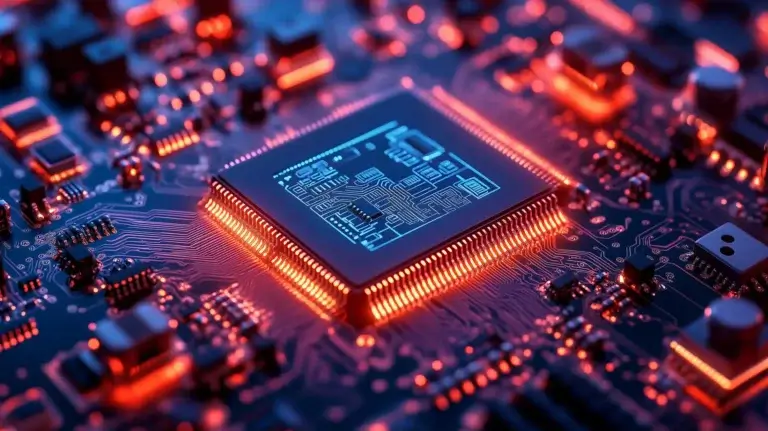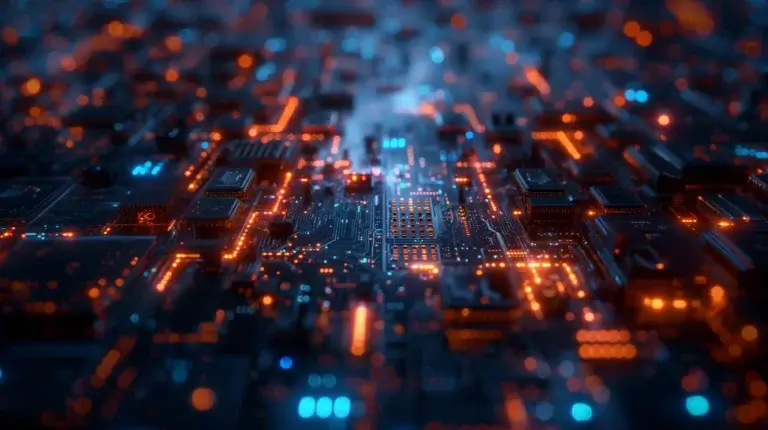Will AI Take All the Engineering Jobs or Aid Productivity?
As artificial intelligence (AI) continues its rapid advance, a thought-provoking question looms over the engineering community: will AI take all the engineering jobs or be the catalyst for innovation and better design?
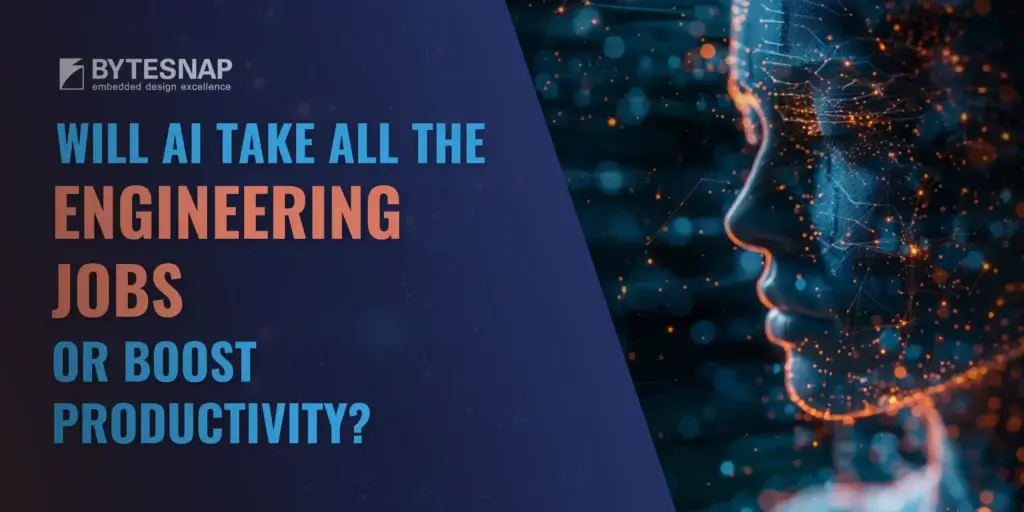
Enhancing productivity through Artificial Intelligence
According to ByteSnap Design’s industry report “AI in Electronics: Balancing Promise & Pragmatism“, which polled over 800 UK engineering professionals, 63% believe AI speeds up design and development cycles, making these processes more efficient and cost-effective.
AI’s ability to quickly analyse a wealth of data means engineers can make better-informed decisions quicker than before.
AI enables engineers to move away from manual processes that would otherwise have taken more of their time, so they can focus on more complex and creative aspects of their projects.
Increased operational efficiency was the most noticeable change ByteSnap survey’s respondents had reported since implementing AI, with 45% citing a marked boost in productivity due to streamlined workflows and automation of tasks in several areas of operation.
There was a significant recognition of AI’s role in transforming work processes and tasks – 65% indicated that it had already transformed the way they work.
AI also supercharges engineers’ capabilities by giving them a toolbox full of additional, alternative ideas and mechanisms for resolving issues and inventing new devices.
AI-powered design software lets engineers explore more options and pick the best ones faster. Add to the toolkit natural language processing (NLP), which is being used by 14.2% of respondents, to help review and check technical documentation, so that everything is accurate.
This opens new opportunities for engineers to innovate and get things done swiftly while ensuring compliance with industry standards.
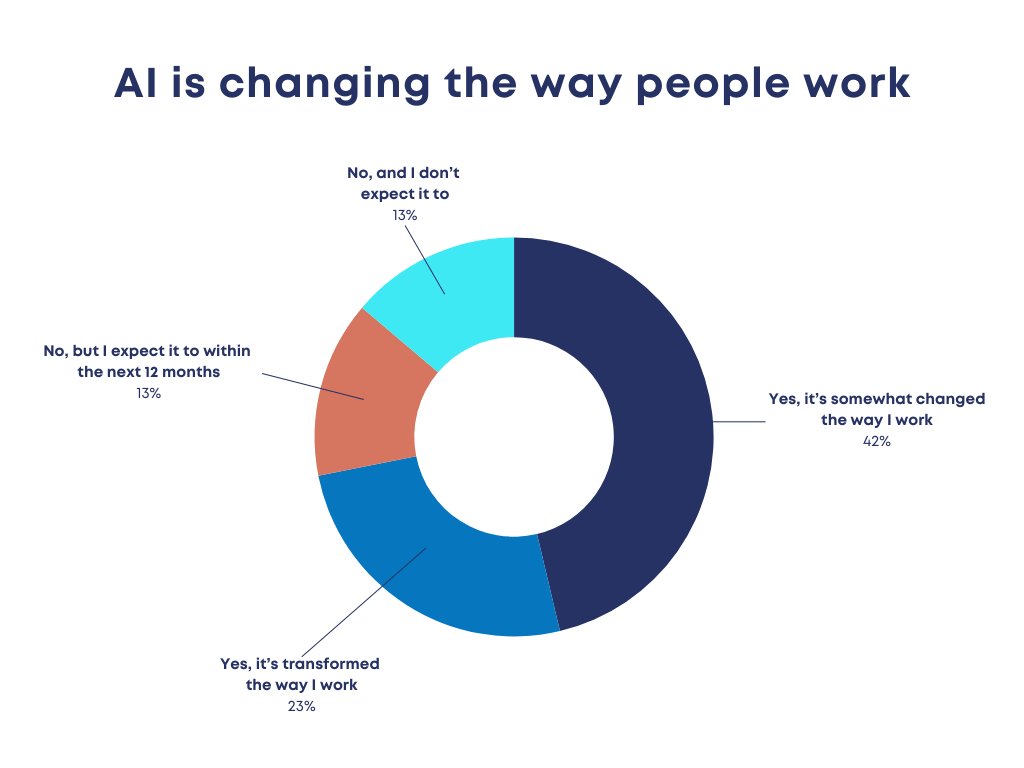
Will AI Take All the Engineering Jobs? Engineers and AI - A Symbiotic Relationship
While some may worry that engineers are creating the technology that could one day steal their jobs, the reality is far more refined.
AI tools are designed to assist rather than replace engineers. They handle repetitive tasks, allowing engineers to use their skills to make the magic happen.
A quarter (25%) of ByteSnap survey’s respondents cited AI as assisting them in increasing innovation and creativity in the rapid development of new concepts, simplifying prototyping process and accelerating the iterative refinement of designs.
The highest percentage of professionals (62%) felt that AI can automate tedious parts of their job, suggesting that automation is a major perceived benefit of AI’s influence on their daily tasks.
45.3% even went on to note that AI provides insights that they would not have had otherwise, indicating a new advantage and one that offers fresh and needed perspectives.
This collaboration between AI and human intelligence leads to better outcomes and more efficient workflows. For instance, AI can simulate and test tonnes of designs in a flash, but it takes a human engineer to interpret and understand the results and make important creative choices.
Irreplaceable engineering roles
It’s less likely for AI to take certain engineering jobs due to the need for human judgment, particularly in complex problem-solving that requires the creative skills they were hired to bring to the table.
Think for a second about designing a whole system – that takes a real person to understand how all the parts go together, so they work correctly.
Besides, jobs that need ethical decision-making, regulatory compliance and user experience design also require the human touch, like insight and empathy, to understand people’s needs.
An example is in the development of AI itself, where ethical considerations and human-centric design are crucial, and engineers must make the right calls to ensure that AI systems play nice with the world around us.
27% of the survey’s respondents felt the biggest challenges when deploying AI would be its bias in data and algorithms. But, having a human engineer on hand to review and mitigate any bias is important to ensure the decisions made are not unfair or discriminatory.
As well as AI, other automated offers in the electronics world benefit from machine learning and human skills.
Take ByteSnap Design’s automated electronic product design which lightens the load off engineers by automating parts of the product development process.
This lets the client’s engineers ditch some of the more repetitive tasks and focus on more strategic and creative aspects so they get more done and come up with even better ideas.
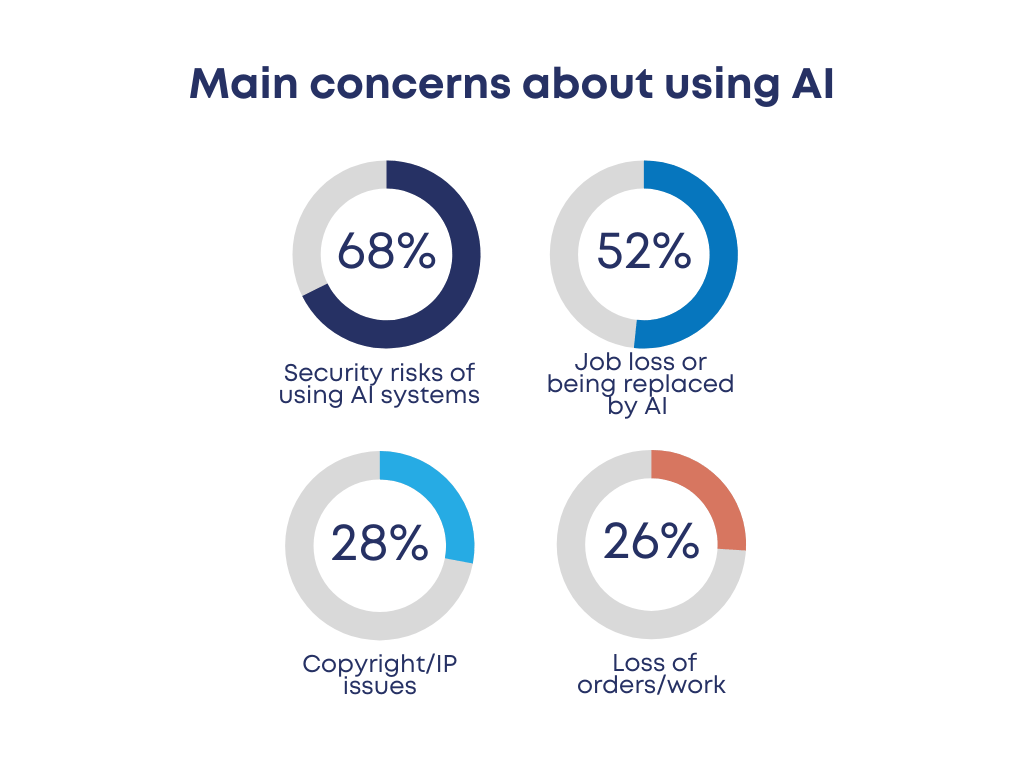
The timeline for Artificial Intelligence in engineering
The engineering industry is buzzing about AI, with a mix of excitement and worry.
While over half (52%) of software engineers are concerned about losing their job or being replaced by AI, even more (63%) see AI positively, thanks to its potential as a tool to boost productivity and accelerate development cycles.
42% have already reported that AI has changed the way they work, and 23% see AI as a total game-changer.
This division reflects a broader trend of cautious optimism, with engineers recognising the transformative potential of AI, while also being aware of its potential downsides. Engineers may be looking over their shoulders, but they are also eager to see what AI can do to assist them and enhance their work.
So, how long until robots take over engineering jobs entirely?
That’s a big question with no easy answer.
The timeline for AI to potentially take over significant aspects of engineering work is still very much debated. Some experts predict substantial advances in AI over the next decade, while others think it as a more distant possibility.
ByteSnap’s “AI in Electronics: Balancing Promise & Pragmatism” report found that the majority of companies (71%) have just started integrating AI over the past 12 months. This suggests that while AI adoption is accelerating, a complete takeover is not imminent.
The truth is that AI will keep getting better and work alongside human engineers as a useful teammate rather than coming for their jobs in the near future.
ByteSnap’s survey also asked about AI implementation plans for those who currently do not use AI at all, and 46% have no plans, suggesting a significant resistance to AI adoption.
So, a complete takeover – if it ever happens! – won’t be anytime soon.
Future-proofing engineering careers
21% of professionals surveyed feared a lack of in-house AI expertise and the shortage of skilled personnel who can develop, deploy and manage AI IT systems is still a substantial hurdle.
However, to AI-proof their jobs, engineers should focus on developing skills that complement AI technologies.
The key to staying relevant is developing current and new skills that work hand in hand with these new technologies so expertise in AI and machine learning, data analytics and systems engineering will be invaluable.
Also, engineers should ensure they continue to be an asset by honing their soft skills, such as problem-solving, critical thinking and creativity, which are all areas AI falls short in.
Staying curious and updated with the latest technological advances, and keeping your skill set sharp will be crucial in staying ahead of the curve.
ChatGPT tops the Engineering AI tech stack
The top AI technology to get a handle on will come as no surprise as (49%) of respondents cited chatbots as the top of the list.
Chatbots eclipse every other use case, probably thanks to their versatility and ease of access.
ChatGPT was by far the most popular AI platform, as over half of those surveyed (61%) had used it to assist them in their work. This is arguably the most publicised platform which could account for its popularity.
Just over a tenth of participants (11%) used AI services from Google (mostly making use of their Gemini chatbot).
Microsoft Azure (11%) was an equally popular platform – used for cloud computing, then IBM’s Watsonx (5%) – used for building/training AI.
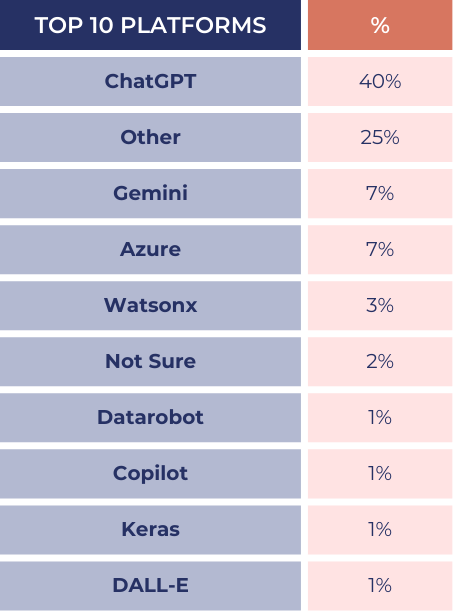
While 3% could not name the AI used – often they were using in-house AI solutions showing that some organisations are pushing for company-wide adoption of AI.
Other interesting use cases include meeting transcription/recording (Otter.ai), CRM (DelightChat) and as a writing aid (Anyword).
Conclusion
In answer to the query, “Will AI take all the engineering jobs?” our whitepaper has found that AI is not poised to absorb all engineering jobs, but rather enhance and transform them.
By automating routine tasks and providing powerful new tools, AI allows engineers to focus on innovation and complex problem-solving.
While concerns about job displacement remain, the industry is generally optimistic about the future.
Engineers who adapt and develop complementary skills will find themselves at the forefront of this exciting transformation.
As the report concludes, the key lies in balancing the promise of AI with pragmatism, ensuring that this technology is harnessed responsibly and effectively to benefit the engineering profession.

ByteSnap Design co-founder Graeme Wintle is one of the UK’s most experienced Microsoft Windows CE developers and is highly sought after for his expertise in migrating and security operating systems.
After graduating in Software Engineering from Newcastle University, Graeme quickly distinguished himself in software development at Nokia, GST Technology and Intrinsyc.
Graeme has been helping companies around the world with embedded software development for over twenty years. His cutting-edge design work has been instrumental in establishing ByteSnap at the forefront of embedded system design.
Graeme is the inventor of powerful, flexible user interface development framework, SnapUI.


